Previously posted (May 10, 2021), this article has been published in Harp Therapy Journal vol. 28, No. 2 Summer 2023
There are many ways to make your practice session more meaningful. I’m going to suggest five methods to make your practicing at music a healing process. A good way is to get started with an open mind. Begin with no worries of mistakes, for that will paralyze you from the get go. Besides, mistake are a part of life, we all make them, so you might as well just stay positive. Best to start with some advice from Benjamin Franklin, “Do not anticipate trouble or worry about what may never happen. Keep in the sunlight.”
Let Go
I love hearing and watching a student play through a song in its entirety for the first time during a private harp lesson. As I listen, I’m also watching for other details.That initial play-through, shows a musician’s excitement or nervousness, where the smooth parts and the rocky parts are in the song for them, and how they physically play, hopefully moving in a flow and not being stiff.
During a recent Zoom lesson with an adult student, I noticed that she was holding her breath. To a teacher, this is nothing new. As a young student myself I did this, along with crunching up my face, in concentration. Sometimes, when we focus on one area of the body, like our hands, when we make music, we might stiffen up other “unused” areas of the body, like our face or back. The illusion is that we actually are using all of our body to play.
After the student finished playing, she asked me how she could improve. She was at the point in practicing where she was getting the notes correct and playing with dynamics, but there was something missing. I asked, “Are you holding your breath?”
Ah-ha! Bingo! She lit up and said, “Of course. You know, I’ve been studying yoga for years, and I should know this already.”
I didn’t have to explain much to her; she knew where I was coming from. However, like this student, even after decades of practice, we still need reminders! (This is why even the best life-long musicians continue to learn.)
One way to heal ourselves while practicing is to let go of physical tension. Having body awareness and letting go can alleviate discomfort and actually help us sound better.
Conscious Breathing
Conscious breathing is another way we can make practicing music a healing process. As I have written many times in my Harp Escape blog and YouTube video credits, increased deep breathing, turns into increases blood flow and decreased stress. Deep breathing has also been scientifically proven to promote deeper sleep.
Another way to make practice conscious breathing is to smile! In his book “Peace Is Every Step,” Thich Nhat Hanh gives us many breathing practices. A beginner breath exercise is that when you breath in, you say to yourself, “breathing in, I know that I am breathing in.” When you breathe out, you say, “breathing out, I know that I am breathing out.”
That’s a start. You can change that to a simple, “in” and “out,” as you increase your awareness. When I am troubled, I might take a walk and say, “breathing in I smile,” then “breathing out I find peace.”
Before I begin practicing, I might say something like, “I am here,” and breathing out “sound is flowing through me,” or “inward awareness;” “outward presence.”
A personal mantra can change per day, or it can be the same every day. Whichever you choose, the point is that through awareness of breath, we can become more centered people within our bodies, which in turn makes us more centered players, because we connect more fully and aware with our instrument and what we are doing. Conscious breathing, helps the energy of sound flow through us too.
Intention
A third way to practice music as a healing process has to do with your intention. As a Certified Clinical Musician, I have taken a similar Hippocratic Oath as nurses have, a promise to do no harm. When I play harp at the bedside in hospice or at a hospital, I follow a code of ethics to respect human dignity, to avoid doing intentional harm. Most importantly, I take no claim that if the patient recovers from their illness, the music I offered was not the reason why; it may have helped but it was by no means the sole reason, and I do not take ownership of the sound offering. Nor do I take blame if the patient dies or goes into cardiac arrest while I am playing. My intention is always and forevermore this: that when I leave a patient they are in the same or better condition as they were when I arrived. I never leave them worse off, and if I see things going in that direction, I stop playing music immediately, and seek the aid of a nurse or doctor.
During the pandemic, one of my students’ daughter’s went into heart surgery. Mother and daughter were 2000 miles apart from one another, and my student (let’s call her Anne) could not be at her adult child’s side. She was visibly heartbroken, and I commended her on showing up for her lesson that day. I said, “Why don’t we play harp today for Julie. We are going to send her the intention of healing and having a successful surgery.”
Our intention during the lesson, was to send our harp practice into the surgical room at Mayo Clinic in Rochester, Minnesota. I understand that not everyone believes in this idea of suspended remote healing. There is no way to quantify if our efforts were real or not. However, if we look to the Hippocratic Oath, there is no harm in this effort either. In fact, from my student Anne’s perspective, it was healing for her, to be able to send this intention of loving care to her daughter, when she could not physically be there in her hour of need.
At the lesson’s end, Anne thanked me, and said how better she felt. Later that day, she reported that Julie’s surgery was indeed a success. Again, we take no claim, and no blame for Julie’s surgery or recovery, but if we look at the mother Anne, this power of intention was healing for her as a musician.
Enter the Zone
Personally, I think one of my favorite things about playing music is getting into “The Zone,” especially if I’m playing with other people. “The Zone” as it is known, is a flow state enjoyed by anyone with extreme focus from basketball players, to jazz musicians and meditating monks.“The Zone” is the Gamma wave state of the brain.
There are five main brain wave length states Delta, Theta, Alpha, Beta, and Gamma. Each have their own vibration. If you’re connecting with someone in conversation and they say, “We are on the same wavelength,” that is literally true.
When we are sleeping, we are in Delta waves. Theta vibrates just slightly above that, are when we are alert and relaxed. Alpha is when you are awake and active, perhaps walking, eating dinner, or driving a car. According to NeuroHealth.com Beta waves are fast, and help you be alert and focused. Gamma waves are where we get into “Ah-Ha Moments” and we have hightened perceptions, perhaps connecting to our higher self. In Gamma we have cognitive processing, problem solving, yet we may also experience oneness, say, when we play music. When we lose ourselves in the the richness of our activity, time ceases to exist. We could be playing for 5 minutes or 55 minutes. We don’t know. We are in The Zone.
When we actively study music, learn our technique, or think about the theory; we are studying and concentrating in a higher Beta state. If we are lucky, we get to a place of proficiency, and can play freely enough so that our vibration level elevates up to Gamma. I find myself get tingly sometimes when this happens. Improvising is a door to entering the Gamma state. Certainly a classical player in a symphony can “lose themselves” playing, as the entire orchestra joins as one. A jam band rides a rhythmic wave together. All of these are musical possibilities to a enter the heightened state. The Zone is whenever you as a musician lose yourself in the the sound, and you play so automatically and freely, its like an unseen hand is at your instrument playing for you. This is nature’s original “streaming platform.”
When Sufi mystic Rumi wrote, “Knowing that conscious decisions and personal memory are much too small a place to live, every human being streams at night into the loving nowhere, or during the day, in some absorbing work,” he was talking about entering the Gamma state.
He was saying that decision making (Alpha or Beta) and reliving memories (Delta or Theta) are small places to live in one’s mind, compared to the place one can go beyond that. Expanding one’s mind (in Gamma) is not done so logically, but with a deep inner knowing that connects one to what Rumi calls “the loving nowhere.” The Zone is nowhere. The Zone is everywhere. The Zone is no one. The Zone is the inner-connected oneness to everyone and everything simultaneously and time is not a straight line.
To get into the loving nowhere of The Zone is the ultimate place of self-healing. In the zone you no longer are concerned about perfectionism, self-consciousness, or criticism. The busy mind is at rest. How do you get into The Zone when you practice music? Start by letting go of guilt and negativity. Sit down at your instrument with intention of creating something pure, whatever that it is. Be kind to yourself. Whatever you chose to practice, be present with the sounds you make and really listen to yourself and others.
Practice Your Feel Good Music
If you like Stevie Wonder, and you’re just getting into guitar or piano, his tune “Isn’t She Lovely” isn’t too hard to learn – its very uplifting and is only four chords. If you’re sad, frustrated and mopey, you might resonate by playing the American folk tune “Poor Wayfaring Stranger.”
I worked on both of these tunes with two of my high school students during the pandemic. One needed upbeat pop music in major keys to make her feel good. The other was stressed from online school, feeling angry, and just wanted to mope in her music, so she loved playing the somber A minor folk song.
Every 4-6 weeks, I get some new arrangements for my students, either that I create, or they find. Then we have a lesson with about 5 new tunes and I play through them so they can hear what it would sound like on the harp and they decide what makes them feel good, and what they’d be motivated to learn.
Feel good music, doesn’t mean the song has to be a peppy jump up and down anthem tune. What matters is that you, the player, feels good as you play. Meet yourself where you are at. Moods change, which is why we have so many types of music!




Thank you Monica! This is a beautiful and insightful reminder about practicing and playing music, just now as I am beginning to get back into some regular practice sessions after a long absence. Thanks for the inspiration!
This is great. I have been reengaging with the classical guitar for the past year. Practicing and studying daily. Just recently it has been a bit frustrating. Drifting focus and general exhaustion after a full day of work sometimes makes it hard to stick with it. Perfect timing for this email. Thanks!
Fascinating article, luv it, enriching!
Thank you for this! I’m currently a music student and have been struggling all my life with damaging mindsets around improvement. Despite that though, I want to keep going with my musical pursuits. I’ve even considered the music therapy path myself! Until then, I’m repairing my relationship with music. Thank you for the insightful words!
Glad to be of help to you Arwen! Mending one’s inner relationships is powerful. Best wishes to you.